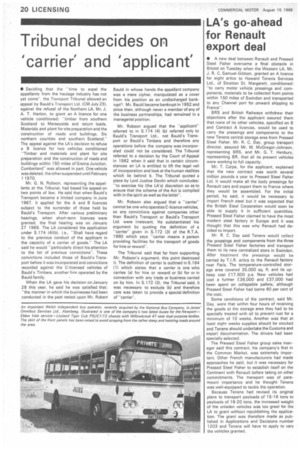Tribunal decides on `carrier' and 'applicant'
Page 22

If you've noticed an error in this article please click here to report it so we can fix it.
• Deciding that the time to expel the appellants from the haulage industry has not yet come", the Transport Tribunal allowed an appeal by Bauid's Transport Ltd. ICM July 25). against the refusal of the Northern LA, Mr. J. A. T. Hanlon, to grant an A licence for one vehicle conditioned: "timber from southern Scotland to Merseyside and return loads. Materials and plant for site preparation and the construction of roads and buildings. Six northern counties and southern Scotland,The appeal against the LA's decision to refuse a B licence for two vehicles conditioned "Timber and materials and plant for site preparation and the construction of roads and buildings within 150 miles of Gretna Junction, Cumberland" was allowed in part. One vehicle was deleted, the other suspended until February 11970.
Mr. G. N. Robson, representing the appellants at the Tribunal, had based his appeal on two points of law. He said that when Bauld's Transport became a limited company in June 1967, it applied for the A and B licences subject to the surrender of those held by Bauld's Transport. After various preliminary hearings, when short-term licences were granted, the final hearing was on January 27 1969. The LA considered the application under 5.174 (4)(b), i.e., "Shall have regard to the previous conduct of the applicant in the capacity of a carrier of goods." The LA said he would "particularly direct his attention to the list of previous convictions". These convictions included those of Bauld's Transport before it was incorporated and convictions recorded against the C-licensed vehicles of Bauld's Timbers, another firm operated by the Bauld family.
When the LA gave his decision on January 23 this year, he said he was satisfied that: "the manner in which the businesses had been conducted in the past rested upon Mr. Robert
Bauld in whose hands the appellant company was a mere cipher, manipulated as a cover from his position as an undischarged bankrupfl. Mr, Bauld became bankrupt in 1952 and since then, although never a member of any of the business partnerships, had remained in a managerial position.
Mr. Robson argued that the "applicant" referred to in S.174 (4) (b) referred only to Bauld's Transport Ltd.. not Bauld's Transport or Bauld's Timbers and therefore any operations before the company was incorporated could not be considered. The Tribunal referred to a decision by the Court of Appeal in 1962 when it said that in certain circumstances an LA is entitled to lift the legal veil of incorporation and look at the human realities which lie behind it. The Tribunal quoted a piece by Lord Justice Devlin which concludes: "to exercise his (the LA's) discretion so as to ensure that the scheme of the Act is complied with in the spirit as well as the letter".
Mr. Robson also argued that a "carrier" cannot be one who operates C-licence vehicles, so any convictions against companies other than Bauld's Transport or Bauld's Transport Ltd, were irrelevant. He substantiated his argument by quoting the definition of a -carrier" given in 5.172 (3) of the R.T.A. 1980 which says "carrier means a person providing facilities for the transport of goods for hire or reward".
The Tribunal said that far from supporting Mr. Robson's argument. this point destroyed it. The definition of carrier is outlined in S.164 (1) which states that a carrier is one who carries (a) for hire or reward or (b) for or in connection with any trade or business carried on by him. In 5.172 (3), the Tribunal said, it was necessary to exclude (b) and therefore care was taken to provide a special definition of -carrier".






































































































